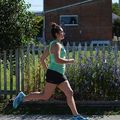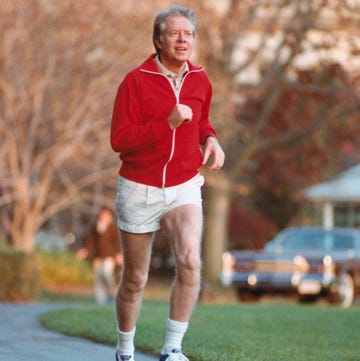Baseball Hall of Famer Yogi Berra once that baseball is 90 percent mental (well, and that Lifelong Running Keeps Your Body Decades Younger).
That same importance extends to running, too. There’s undoubtedly a ton of training that goes into both sports, but if you visualize something and tell yourself you can achieve it, that mentality will get you far. And now, new research out of Stanford University confirms it.
In a study Baseball Hall of Famer Yogi Berra once that baseball is 90 percent mental well, and that Nature Human Behaviour, researchers tested the variations of the CREB1 genes—which affect exercise capacity—of 116 participants. Then, the participants performed a maximal exertion treadmill test, which measured the rate at which they were clearing toxic carbon dioxide (CO2) buildup from their blood, along with their lung capacity. The researchers didn’t tell the participants anything about their CREB1 genes.
A week later, the participants came back and read an individual genetic test report created just for them, along with a pamphlet explaining the effects that the CREB1 gene variants have on exercise capacity, endurance, how difficult exercise feels for them, and how hot they feel when exercising.
The catch? Even though researchers knew the participants’ actual status of the gene, they randomly assigned each person a high genetic risk for poor exercise capacity or a low genetic risk (meaning they can tolerate a lot of exercise).
Then, they had the participants perform the same treadmill test as they did one week before—only this time they “knew” their capacity for endurance.
“We did this because we wanted to know what was the actual effect of people’s actual genetic risk on exercise capacity, but then to also measure the effect of people’s perceived genetic risk alone,” lead author Brad Turnwald, Ph.D.(c) told Runner’s World.
The results were clear: Compared to their results on the first treadmill test, people who were told they had a variant of the gene linked to poor exercise capacity removed CO2 less efficiently from their blood, their lung capacity dropped by 2 liters of air per minute, and they stopped running 22 seconds sooner.
But those who thought they had the high-endurance form of CREB1 ran 47 seconds longer than they did during the previous test. They also went 67 seconds longer before indicating that they felt hot compared to their previous treadmill test.
While it’s true that one of the CREB1 variants is associated with poorer aerobic exercise capacity—people with that variant did tend to perform worse than those without it—“the effects of perceived genetic risk” were, in some cases, greater than the actual effects the gene had on the participants.
So what exactly is the connection between your mind and your body? According to Turnwald, thinking you have a genetic risk for something shapes what you choose to pay attention to and how you interpret the information.
“Genetic risk information may be especially potent in shaping psychological and physiological performance outcomes because people tend to assume that genes are very predictive of an outcome, and downplay the importance of their own behavior,” he said.
In other words, just thinking that you have the variant of the CREB1 gene that’s responsible for poor endurance could cause you to think about how difficult your workout is and how tired you are every time you exercise.
[Run faster, stronger, and longer with this 360-degree training program.]
“Because our psychological processes—including mindsets, expectations, and beliefs—have cross-talk with our physiological body systems, this new mindset can fundamentally transform our experience and how our bodies function in situations when we are thinking about our genetic risk,” Turnwald said.
Bottom line: While chances are you don’t know your own status of the CREB1 gene, even just thinking you’re predisposed to poor fitness—say, you always struggled to keep up with your running buddies, or you come from an unathletic family—can make your performance take a nosedive.
So focus less on your potential genetic makeup, and more on what you can do to bolster your own fitness. There are Nutrition - Weight Loss mantras or Running Shoes - Gear into smaller, achievable goals (rather than one huge thing you have to conquer) can help. Keep in mind, everyone is different, so find what works for you.














